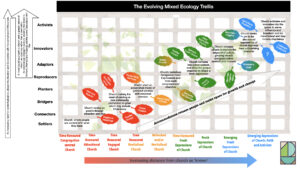We are intertwined systems, they shape us and we, in turn, shape them. In the years I been blogging here I have long explored the tangled roots of mission, church, and community, resisting the urge to slip into tidy dualisms or easy binaries. Instead, I’ve tried to inhabit that compost-rich space where culture and nature, activism and contemplation, all intermingle. As I look to the next chapter I want to reflect on that learning particularly from the “Crafting Mission in Systems” journey and see how they are resonating with the work of Alchemy At The Edge. Skip to the bottom of the post if you want to see 3 services that people are finding particularly helpful at the moment.
From Compost to Craft: Mission as Alchemy
Mission is not a static program to be rolled out, an ABC or a rock-solid truth to be defended. It’s a living, breathing system, a field of relationships, stories, and experiments. We are not outside the system, tinkering with its gears; we are the system. As Bayo Akomolafe says, “we are not stuck in traffic, we are the traffic”.
Alchemy At The Edge, in its very name, hopes to evoke the ancient art of transformation. Alchemy was always more than a quest to turn lead into gold; it was a way of seeing, a practice of attending to the hidden processes that bring about change, both in matter and in the soul. The alchemist’s work was slow, patient, and deeply attentive to the interplay of elements. In the same way, I hope my services are about facilitating transformation within organisations, teams, and individuals, not by imposing a blueprint, but by cultivating the conditions for emergence and growth.
Letting Go of Control: Embracing the Unknown
One of the persistent themes in Sunday Papers is the tension between epistemology (knowing, controlling, securing) and ontology (being, becoming, risking). In the “Crafting Mission in Systems” post, we are reminded that real change rarely comes from clinging to certainty. Instead, it emerges when we risk stepping into the unknown, when we allow “grace spaces” to disrupt our routines and invite us into new patterns of relationship.
Alchemy At The Edge’s approach will mirror this and are be not about delivering off-the-shelf solutions or quick fixes. Recently I worked with a diocese and the planning and preparation sessions with the leadership team were so key in making sure what was delivered was not just properly contextual but also spoke to the deeper issues being faced. I want to work alongside people and systems to co-create processes that honour the complexity and uniqueness of every context. To help organisations raise their head beyond the pulpit and step into new possibilities, trusting that something richer and more generative can emerge.
Systems, Stories, and Soul Work
At the heart of both the Sunday Papers ethos and Alchemy At The Edge’s practice is a commitment to deep listening and story. Systems are not just structures; they are made up of people, histories, and hopes. Transformation happens when we pay attention to the stories we tell, the rituals we practice, and the ways we show up for one another.
Alchemy At The Edge will facilitate this kind of soul work within organisations not just individuals. Creating spaces where teams can surface hidden assumptions, name what matters most, and imagine new ways of working together. Like the alchemist, they know that true change is both an art and a science, that it unfolds in stages, often requiring us to sit with uncertainty and paradox.
The Edge of Becoming
To craft mission in systems is to embrace the messy, generative work of transformation. All models are wrong but some are helpful. As I have started having conversations and work with dioceses and other clients a few key assets/models/processes have emerged that people are finding helpful and I can build sessions around. These include
1. Scale – Scaling Out is pretty straight forward as good ideas spread but Scaling Up or Deep is more challenging. I have been working on processes that help identify what and blocks and opportunities for Scaling Up and Deep which will embed and accelerate change.
2.Mixed Ecology Trellis – lots of dioceses have found the Trellis helpful to describe and value the whole Mixed Ecology of church, but don’t realise that it can be operationalised as a diagnostic tool both for leadership development and to Scale Out at local and regional levels.
3 Theory of change development – if you aim at nothing you hit it. Recent sessions helping people explore the why behind what they do have been helpful in designing better processes. This not only ensures that what they value is front and centre but that these values inform and drive real change. Too often organisations talk about being values driven without a real understanding or process to ensure they translate in action and lasting change.
In the end, perhaps the greatest gift we can offer is to hold space and to trust that in the compost something beautiful and unexpected can take root.
“We are all in the system. The truth is at hand and it’s held with an open palm… the kin-dom is so much more than we can imagine.”
For a conversation on what I can offer your organisation or diocese please GET IN TOUCH

